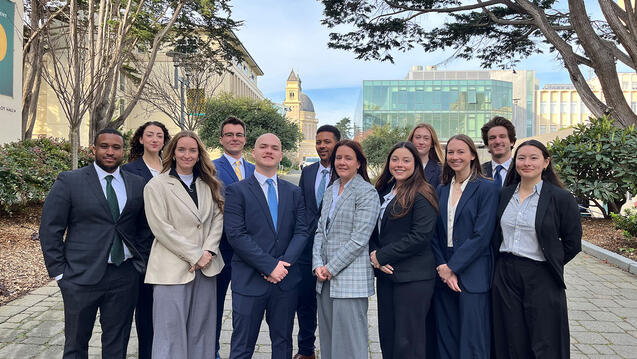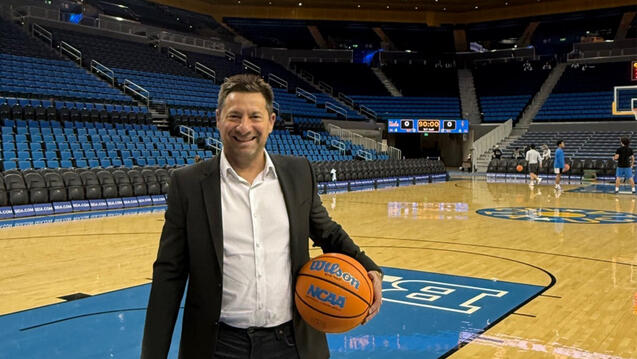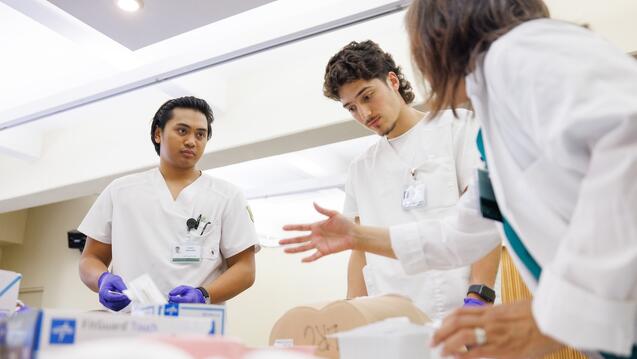Mindfulness Matters
How can reflection improve hospital patient care? Why does meditation seem to foster open-mindedness towards others? The answers to these questions are at the heart of mindfulness practices being adopted in a growing number of classes at USF, from ceramics and nurse leadership to the history of Christian contemplative practices.
Mindfulness is a way for students to consciously reflect on and analyze what they’ve learned from different perspectives in a search for meaning, says University Ministry Associate Director Donal Godfrey, S.J., who regularly leads mindfulness seminars for students, faculty, and staff on campus. “Many people think mindfulness means sitting in circle with your eyes closed. But mindfulness isn’t the same as mediation and it isn’t necessarily religious,” Fr. Godfrey says. “There are many ways to be mindful — mediation is just one.”
At USF, mindfulness is often taught through group discussions, journaling, and meditation.
Then the real discussion begins
Chenit Ong-Flaherty, assistant professor of nursing, first incorporated mindfulness into her graduate nurse leadership classes last year by organizing group discussions about common sticking points nurses encounter when working with patients from different cultures.
The results are often eye-opening.
The students, all working nurses, express frustration with their inability to relate to others during an exercise that separates the class into two imaginary cultures. “They use words like ‘hostile,’ ‘dumb,’ ‘unfriendly,’ and ‘foreign’ to describe the other groups,” Ong-Flaherty says.
That’s when she introduces a question she’s been saving. “And what is a hospital?” she asks.
The students look at her quizzically. But it doesn’t take long for the answer to surface. A hospital is its own culture — one full of little-known rules, a unique language, and customs that only employees understand. It’s like knocking over the first in a line of dominoes; suddenly the students begin to see themselves through their patients’ eyes.
“Then the real discussion begins,” Ong-Flaherty says.
In the School of Law, Professor Rhonda Magee has become a national leader on humanizing legal education. She’s been incorporating mindfulness and meditation into classes for years as well as publishing such articles as “Contemplative Practices and the Renewal of Legal Education” and “Educating Lawyers to Meditate?”
“In my courses on Contemplative Lawyering and Contemporary Issues of Race and Law, mindfulness teaches students to be present, to slow down, to acknowledge what is, and to ask questions that they need to deepen their understanding,” Magee says. “They learn to engage with reality in ways that more effectively help them solve problems in the world.”
Don’t lose your head
For Vincent Pizzuto, associate professor of theology and religious studies, mindfulness means connecting with what people have in common. “The fundamental aim of mindfulness is to foster the cultivation of compassion and selflessness,” says Pizzuto, who incorporates meditation as part of a series of classes he teaches on Christian contemplative practices.
“In the Christian contemplative practices class, we close our eyes, focus our breathing, and repeat a prayer word in our heads,” says Savannah Jones ’18, a theology student in one of Pizzuto’s classes. “It’s helped me understand God in a new way, and to try to get over the human concepts I’ve attached to God.”
Sara Sepandar ’16 had no prior experience with mindfulness when she started doing reflective journaling about the artistic process in her ceramics class. But it helped the architecture and community design major put things in perspective. “I wish more classes did it,” she says. “I think a lot of students lose sight of what’s important and mindful reflections really help.”
“Mindfulness is at the core of being attentive to what we are doing and what we are learning and how the process of learning affects our human being,” says Arturo Araujo S.J., assistant professor of fine arts. “I think this is maybe the most important ability.”
Know someone with a powerful USF story? Let us know! usfnews@usfca.edu


